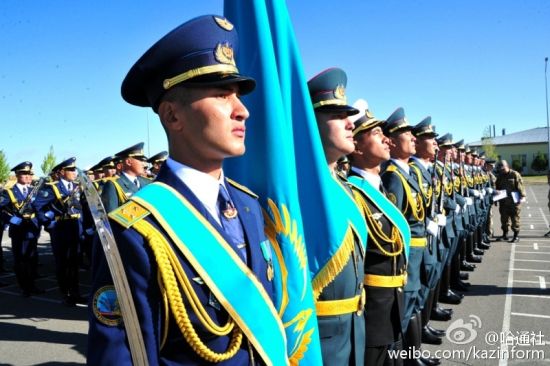Visiting troops for parade begin arriving in capital
By ZHAO SHENGNAN/CUI JIA (china Daily) Updated: 2015-08-18 07:47Sept 3 marks first time foreign forces are invited to participate in event to send message of peace
 |
|
Kazakhstan's guard of honor is leaving for Beijing to participate a military parade to mark the 70th anniversary of victory in the War of Resistance against Japanese Aggression, Aug 16, 2015. [Photo/People.cn] |
Foreign troops have been gathering in Beijing to prepare for their participation in China's military parade on Sept 3 to mark the 70th anniversary of victory in World War II.
More than 100 soldiers of Kazakhstan's guard of honor left for Beijing on Monday after training ended in their nation's capital, Astana, on Saturday, the Kazinform news agency reported.
The team, established in 2002, will soon participate in training with their Chinese counterparts, Kazinform said.
Eighty-five Russian soldiers are expected to arrive in Beijing on Tuesday morning. They will stay at a military region in Beijing's Changping district and soon join the parade rehearsals, Russian media said.
Two other military groups-one from Tajikistan and one from Kyrgyzstan-arrived in Beijing on Sunday night.
The Sept 3 event is the first time that China has invited troops of other nations to participate in a military parade, which is usually held once a decade to mark the country's National Day on Oct 1.
This year's parade also celebrates the 70th anniversary of victory in the War of Resistance against Japanese Aggression (1937-45).
Speaking of the invitation, Qu Rui, deputy director of the parade steering group office, said in June that the parade aims to connect history with the future, and China with the world, and will send a message of peace and development.
Mongolia will send 75 soldiers to the parade, Mongolian Ambassador to China Tsedenjav Sukhbaatar said in June. China's invitation acknowledges Mongolia's contribution to the war in China, he added.
The forces of the Soviet Union and Mongolia fought invading Japanese troops at Zhangjiakou and Chengde, near Beijing, at the final stages of the war.
"Participation of foreign countries will highlight all the nations' shared victory and send a united message related to today's regional issues," said Wang Haiyun, a senior adviser at the China Institute for International Strategic Studies.
The participation of China's neighboring countries especially serves as a key opportunity to strengthen China's relationship with them, Wang said.
In July, leaders of all the other member states of the Shanghai Cooperation Organization-Kazakhstan, Kyrgyzstan, Russia, Tajikistan and Uzbekistan-have confirmed their attendance at the Beijing event.
Wang said he is confident about the performance, as China has solid plans and experience with large-scale events, and the foreign troops who will participate are also experienced.




